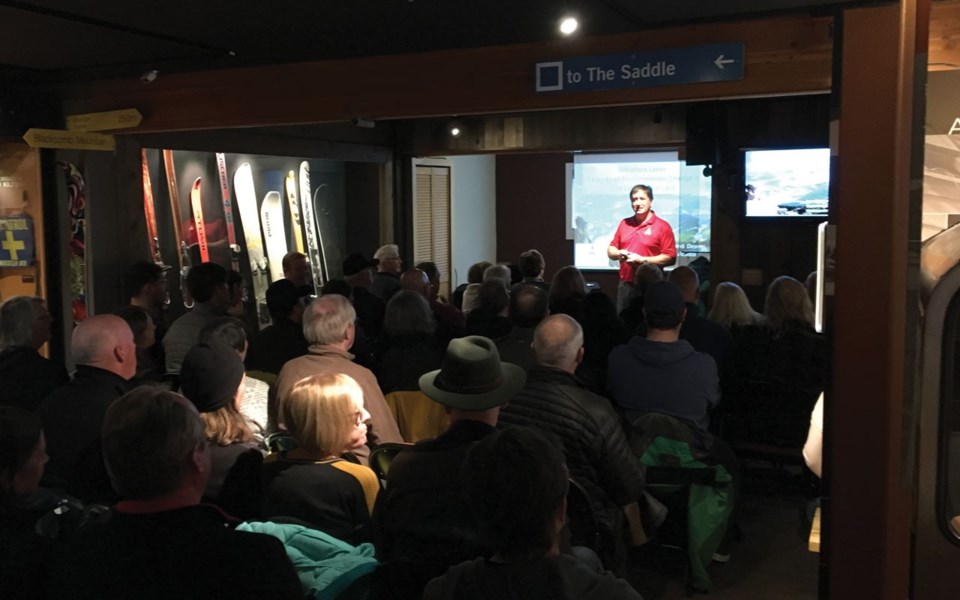Calling all local history buffs: your knowledge of Whistler's lakes is needed—or, more specifically, your stories about the evolution of Lost Lake and Alta Lake.
"The reason I'm doing this talk is because I need stories. I do a lot of science on lakes ... but the science isn't worth anything without the stories," said Ian Spooner, head of the Department of Earth and Environmental Science at Acadia University, in a talk at the Whistler Museum on April 11.
For several years now, Spooner has been doing paleolimnology work on some of Whistler's lakes—taking core samples of lake sediment to understand both external and internal influences on the lakes.
More recently, he's taken to comparing Alta Lake and Lost Lake—the former a lake with a lot of development, and the latter a lake largely removed from those pressures.
While all core samples will show signs of "natural variability"—impacts on the lake from the natural environment—it's the less-standard deviations that Spooner is looking for.
In the case of Alta Lake, recent core samples show copper and arsenic levels returning to normal background levels (good news), while productivity and human-caused "nutrient loading"—signaled by an increase in nitrogen—continue to increase (bad news).
"With nitrogen, it's a signal of human nutrient loading—so poop and pee," Spooner said.
"And it's not going back either."
Many people have asked him what the cause might be, and "we think we see a strong signal of septic," Spooner said.
The Resort Municipality of Whistler (RMOW) is still working to connect 33 lots on Alta Lake Road (on the west side of Alta Lake) to the municipal sewer system—the last remaining homes in the valley still using private septic tanks.
The RMOW has budgeted $100,000 for the project in 2019, followed by $3,002,500 in 2020 and $500,000 in 2021, all from the sewer capital reserve.
An RMOW spokesperson said staff have met with a resident representative and the municipality is "working with them to prepare a petition for a local area service. We expect that paperwork will be circulated to those residents in the coming weeks."
There have been many studies done on Alta Lake over the years, looking at everything from environmental impacts and the source of elevated coliforms to swimmer's itch and ecosystem degradation, Spooner said, adding that recent water quality studies have shown the lake to have excellent water quality.
But Spooner's data shows a deviation from the long-term norm.
"There's always variability, whether it's a little ice age or some climate events, but this is not within normal variability," he said, adding that copper and arsenic returning to background levels is a positive, but "the carbon and nitrogen aren't good, and they don't seem to show a trend of returning.
"So we should be very vigilant right now."
Consistent outbreaks of swimmer's itch (more common with increased human nutrients) are "extremely hard to deal with," he added.
To get a better understanding of what's happening in Alta Lake, Spooner turned his attention to the quieter shores of Lost Lake.
"We did the work (at Lost Lake) because we wanted to see how much of the arsenic and the copper and the zinc and the things we saw in Alta Lake were geogenic, or geological, and how much of them might be associated with development," Spooner said.
"Because Lost Lake has got a different history, and I think people have been fairly careful about protecting that watershed from development."
But to get a more fulsome understanding of Lost Lake's pressures, Spooner needs to hear from Whistler locals.
"I've got to know where the water is coming from, because that's where the minerogenic matter is coming from—the little clay, silt particles that carry the metal. I've got to know where the geology is, where the rivers are feeding that sediment into the lake from," he said.
"I need the history of water course development for Lost Lake, and I think the museum is going to help ... but I think people here might have stories."
Anyone with information to share is welcome to reach out to Spooner by email at ian.spooner@acadiau.ca.




